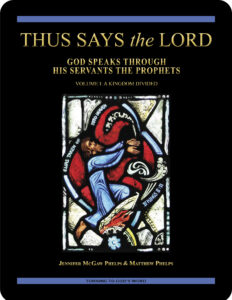 Thus Says the LORD: God Speaks Through His Servants the Prophets
Thus Says the LORD: God Speaks Through His Servants the Prophets
Volume I: A Kingdom Divided
Lesson 14 Jezebel’s Violent Death
the Second Book of the Kings 9:1–37
Revised Standard Version Catholic Edition (RSVCE)*
New American Bible Revised Edition (NABRE)*
Catechism of the Catholic Church
ex libris (in our library)
glossary for Thus Says the LORD—Volume I
cross references in Thus Says the LORD—Volume I
next lesson: Jehu Avenges the Deaths of the Prophets
This material coordinates with Lesson 14 on pages 87–91 in Thus Says the LORD: God Speaks Through His Servants the Prophets—Volume I: A Kingdom Divided.
“Behold, the days are coming, says the LORD, when I will make a new covenant with the house of Israel and the house of Judah, not like the covenant which I made with their fathers when I took them by the hand to bring them out of the land of Egypt, my covenant which they broke, and I showed myself their Master, says the LORD. But this is the covenant which I will make with the house of Israel after those days, says the LORD: I will put my law within them, and I will write it upon their hearts; and I will be their God, and they shall be my people. And no longer shall each man teach his neighbor and each his brother, saying, ‘Know the LORD,’ for they shall all know me, from the least of them to the greatest, says the LORD; for I will forgive their iniquity, and I will remember their sin no more.”—the Book of Jeremiah 31:31–34
welcome to Volume I of our in-depth study of the biblical prophets
We invite you to check out the sample first lesson and video from Volume I of this Turning to  God’s Word
God’s Word  two-part Catholic Bible study. Our online pages link to the free related lesson videos, a glossary, and cross references in the biblical text, and include maps, additional commentary, and prayers based on the primary Scripture in each lesson. Thus Says the LORD: God Speaks Through His Servants the Prophets—Volume I: A Kingdom Divided contains 28 lessons and has been granted an imprimatur. It may be purchased from our website shop. The companion 23-lesson Volume II: Restoration & Redemption also is available for purchase. If you have a Bible-study question or comment, click on the “ask us your question” or “what do you think” button on any study page.
two-part Catholic Bible study. Our online pages link to the free related lesson videos, a glossary, and cross references in the biblical text, and include maps, additional commentary, and prayers based on the primary Scripture in each lesson. Thus Says the LORD: God Speaks Through His Servants the Prophets—Volume I: A Kingdom Divided contains 28 lessons and has been granted an imprimatur. It may be purchased from our website shop. The companion 23-lesson Volume II: Restoration & Redemption also is available for purchase. If you have a Bible-study question or comment, click on the “ask us your question” or “what do you think” button on any study page.
open with prayer
It’s always wise to begin any Bible study with prayer, whether reading the Scriptures alone or meeting with others in a discussion study group. You can pray using your own words or use one of the opening prayers on our website. We especially like the following:
Lord Jesus, you promised to send your Holy Spirit
to teach us all things.
As we read and study your word today,
allow it to touch our hearts and change our lives. Amen.
let’s review—the Second Book of the Kings 8:1–29
In Lesson 13 Hazael Becomes King of Syria, Elisha’s former servant Gehazi seems to have become a pal of Joram, the ruler of the northern kingdom of Israel, and Joram appears especially interested in all of Elisha’s deeds. When the Shunammite woman who had befriended Elisha returns from a seven-year sojourn in the land of the Philistines, Joram restores her property after learning that it was her son whom Elisha restored to life. In Damascus, Elisha is consulted about whether Ben-Hadad, the Syrian king, will recover from injuries suffered in a fall through lattice. Although Elisha instructs Hazael to tell Ben-Hadad that he ‘ll live, Elisha announces that Ben-Hadad will in fact surely die. The prophet weeps because Hazael, the man sent to Elisha to learn Ben-Hadad’s fate, is destined to slay many of the descendants of Jacob living in Israel. Hazael returns to Ben-Hadad and tells the king that he’ll live, but the next day Hazael kills Ben-Hadad and takes the throne. Jehoshaphat’s son Jehoram marries Ahab’s daughter and begins to reign in Judah. Edom and Libnah successfully revolt against Judah’s rule. Jehoram dies and Ahaziah joins Joram in fighting Hazael and the Syrians at Ramoth-Gilead, where Joram is wounded. Joram goes to Jezreel to wait for his wounds to heal, and Ahaziah visits him there.
map notes—fighting for control of Ramoth-Gilead
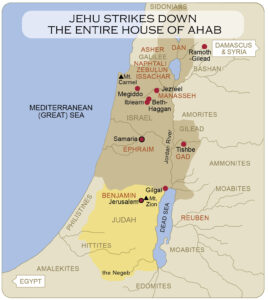 The twenty-second chapter in the First Book of the Kings described Ahab breaking the northern kingdom’s covenant with the Syrian monarch Ben-Hadad to try to re-establish control of Ramoth-Gilead. Ahab was killed in the fighting, and the Syrians kept control of Ramoth-Gilead. The dispute between Israel and Syria has continued, and the Second Book of the Kings 8:29 reported that Ahab’s son Joram had gone to Jezreel to be healed of wounds he received fighting Hazael and the Syrians at Ramoth-Gilead. Now the ninth chapter in the Second Book of the Kings records that Jehu, a commander in the northern army, is at Ramoth-Gilead when he’s anointed king of Israel by one of the sons of the prophets. While a number of kings have come and gone in Israel, Judah, and Syria, the fighting over Ramoth-Gilead continues. Click on the map (right) to enlarge it. The original is on page 90 in Thus Says the LORD: God Speaks Through His Servants the Prophets—Volume I: A Kingdom Divided.
The twenty-second chapter in the First Book of the Kings described Ahab breaking the northern kingdom’s covenant with the Syrian monarch Ben-Hadad to try to re-establish control of Ramoth-Gilead. Ahab was killed in the fighting, and the Syrians kept control of Ramoth-Gilead. The dispute between Israel and Syria has continued, and the Second Book of the Kings 8:29 reported that Ahab’s son Joram had gone to Jezreel to be healed of wounds he received fighting Hazael and the Syrians at Ramoth-Gilead. Now the ninth chapter in the Second Book of the Kings records that Jehu, a commander in the northern army, is at Ramoth-Gilead when he’s anointed king of Israel by one of the sons of the prophets. While a number of kings have come and gone in Israel, Judah, and Syria, the fighting over Ramoth-Gilead continues. Click on the map (right) to enlarge it. The original is on page 90 in Thus Says the LORD: God Speaks Through His Servants the Prophets—Volume I: A Kingdom Divided.
 a dire warning to the southern kingdom (21:09)
a dire warning to the southern kingdom (21:09)
In the video overview for Lesson 14, Turning to God’s Word author Matthew Phelps discusses one of the more dramatic  side effects of an anointed king of Israel murdering the king of Judah. Previous northern kings haven’t been averse to murder, but they’ve limited it to murdering males who posed a direct threat to the throne. Jehu’s killing spree includes not only Joram, the reigning northern king, but Jezebel, the notorious queen mother and widow of king Ahab, and Ahaziah, the ruler of the southern kingdom of Judah. This is one way to discourage the buddy-relationship between the rulers of the
side effects of an anointed king of Israel murdering the king of Judah. Previous northern kings haven’t been averse to murder, but they’ve limited it to murdering males who posed a direct threat to the throne. Jehu’s killing spree includes not only Joram, the reigning northern king, but Jezebel, the notorious queen mother and widow of king Ahab, and Ahaziah, the ruler of the southern kingdom of Judah. This is one way to discourage the buddy-relationship between the rulers of the  northern and southern kingdoms that had begun corrupting worship practices in the south. The southern dynasty’s intermarriage with the line of Ahab poses a special problem that soon will be addressed.
northern and southern kingdoms that had begun corrupting worship practices in the south. The southern dynasty’s intermarriage with the line of Ahab poses a special problem that soon will be addressed.
The Scripture ranges for the videos that accompany this Catholic Bible study match the ranges for the sets of questions in Thus Says the LORD: God Speaks Through His Servants the Prophets—Volume I: A Kingdom Divided. You can follow along with the video as Turning to God’s Word author Matthew Phelps discusses Lesson 14, “Jezebel’s Violent Death,” on pages 87–91 in the study book.
WHAT DO YOU THINK about Jehu’s anointing?
In the First Book of the Kings 19:16, Elijah was told by the LORD to anoint Jehu king of Israel, but it isn’t until after Elijah’s death that Elisha arranges for Jehu to be anointed by one of the sons of the prophets.
 ? What reason is Jehu given for why he’s being anointed?
? What reason is Jehu given for why he’s being anointed?
? Why might God equate the house of Ahab with the houses of Jeroboam and Baasha?
? What offer that was made to Jeroboam isn’t now being made to Jehu in connection with becoming king of Israel?
? Consider whether the LORD has given up on the idea of installing a perpetual kingdom in the north like the one promised to David in the south.
? For what purpose might the LORD continues to send prophets to the northern kingdom when he also continues to wipe out the houses of first one king of Israel and then another?
 The Turning to God’s Word Catholic Bible study The United Kingdom of Israel: Saul, David & Solomon Foreshadow Christ the King contains more information about David as the model king for all of the descendants of Jacob.
The Turning to God’s Word Catholic Bible study The United Kingdom of Israel: Saul, David & Solomon Foreshadow Christ the King contains more information about David as the model king for all of the descendants of Jacob.
biblical vocabulary—avenge
To avenge means to punish or to take revenge. In the Second Book of the Kings 9:6–7, Jehu is anointed king of Israel with oil and these words: “Thus says the LORD the God of Israel, I anoint you king over the people of the LORD, over Israel. And you shall strike down the house of Ahab your master, that I may avenge on Jezebel the blood of my servants the prophets … .”
vengeance—you could look it up in our archives
 The Old Testament sometimes is thought to describe a vengeful while the New Testament describes a merciful God. God’s vengeance is more correctly understood as justice inseparable from mercy. In Lost in Translation, an online column that can help readers connect with ideas expressed in the original languages of the Scriptures, Turning to God’s Word author Matthew Phelps looks at the first appearance of “vengeance” in the Bible. New Lost in Translation entries are posted on Mondays, and past entries are archived on our website. Contact us if you’d like to receive Lost in Translation by email every week.
The Old Testament sometimes is thought to describe a vengeful while the New Testament describes a merciful God. God’s vengeance is more correctly understood as justice inseparable from mercy. In Lost in Translation, an online column that can help readers connect with ideas expressed in the original languages of the Scriptures, Turning to God’s Word author Matthew Phelps looks at the first appearance of “vengeance” in the Bible. New Lost in Translation entries are posted on Mondays, and past entries are archived on our website. Contact us if you’d like to receive Lost in Translation by email every week.
ex libris—what’s up with anointing Hazael king of Syria?
Introduction to the Prophets: Their Stories, Sayings, and Scrolls examines the somewhat confusing idea 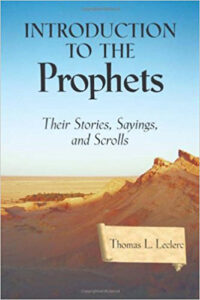 that the prophet Elijah has been charged with anointing Hazael king of Syria and
that the prophet Elijah has been charged with anointing Hazael king of Syria and  Jehu king of Israel so that each can murder descendants of Jacob living in the northern kingdom. The author, Thomas L. Leclerc, M.S. (Missionaries of La Salette), a priest and an associate professor of sacred Scripture at Emmanuel College in Boston, Massachusetts, explains that anointing kings is firmly within the job description of a prophet in the north. In the south, however, the royal dynasty of the house of David makes anointing unnecessary because the kingship there is sanctioned by God as hereditary. At ex libris—main bookshelf, you can read an excerpt from Introduction to the Prophets: Their Stories, Sayings, and Scrolls and learn about other books related to Bible study.
Jehu king of Israel so that each can murder descendants of Jacob living in the northern kingdom. The author, Thomas L. Leclerc, M.S. (Missionaries of La Salette), a priest and an associate professor of sacred Scripture at Emmanuel College in Boston, Massachusetts, explains that anointing kings is firmly within the job description of a prophet in the north. In the south, however, the royal dynasty of the house of David makes anointing unnecessary because the kingship there is sanctioned by God as hereditary. At ex libris—main bookshelf, you can read an excerpt from Introduction to the Prophets: Their Stories, Sayings, and Scrolls and learn about other books related to Bible study.
pray with the Psalms—God personally anoints his prophets
 There’s no biblical record of Elijah actually anointing anyone, even his successor Elisha. It appears that the LORD has chosen to anoint prophets himself in a way that’s different from that used to anoint kings. Psalm 105:12–15 reinforces this idea: “When they were few in number, of little account, and sojourners in it [the land of Canaan], wandering from nation to nation, from one kingdom to another people, he allowed no one to oppress them; he rebuked kings on their account, saying, ‘Touch not my anointed ones, do my prophets no
There’s no biblical record of Elijah actually anointing anyone, even his successor Elisha. It appears that the LORD has chosen to anoint prophets himself in a way that’s different from that used to anoint kings. Psalm 105:12–15 reinforces this idea: “When they were few in number, of little account, and sojourners in it [the land of Canaan], wandering from nation to nation, from one kingdom to another people, he allowed no one to oppress them; he rebuked kings on their account, saying, ‘Touch not my anointed ones, do my prophets no  harm.'” Prayed at Wednesday Vigils (Week I), Psalm 105 will be included as part of Lesson 7 The LORD Remembers His Holy Word in the Turning to God’s Word Catholic Bible study Sing a New Psalm: Communicating with God Through the Prayers of the Church—Volume II: Vigils, Day Prayer & Compline, which is scheduled for publication in late summer of 2025.
harm.'” Prayed at Wednesday Vigils (Week I), Psalm 105 will be included as part of Lesson 7 The LORD Remembers His Holy Word in the Turning to God’s Word Catholic Bible study Sing a New Psalm: Communicating with God Through the Prayers of the Church—Volume II: Vigils, Day Prayer & Compline, which is scheduled for publication in late summer of 2025.
so what’s really going on with this anointing?
Kings, on the other hand, are anointed by having oil poured over their heads by prophets chosen by God. It’s significant that when Hazael becomes king of Syria, he isn’t actually anointed by Elisha, and that when Jehu becomes king of Israel, Elisha passes the task of anointing to one of the sons of the prophets, a person with considerably less spiritual clout. To be anointed means to be set aside for a specific sacred task. Hazael and Jehu are indeed set aside for the purpose of avenging the deaths of the God’s prophets, but this isn’t a  king’s job description. The Turning to God’s Word Catholic Bibles study The United Kingdom of Israel: Saul, David & Solomon Foreshadow Christ the King contains information about what God considers the primary responsibility of kings.
king’s job description. The Turning to God’s Word Catholic Bibles study The United Kingdom of Israel: Saul, David & Solomon Foreshadow Christ the King contains information about what God considers the primary responsibility of kings.
what’s happening when & where
 Click on the timeline for Lesson 14 to expand it. It also appears on page 89 in the study book.
Click on the timeline for Lesson 14 to expand it. It also appears on page 89 in the study book.
t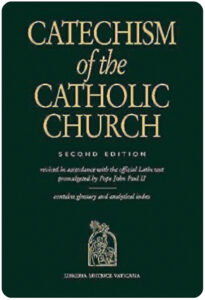 he best Catholic commentary about Scripture
he best Catholic commentary about Scripture
To find out more about how Church teaching is supported by Scripture passages in Thus Says the LORD: God Speaks Through His Servants the Prophets—Volume I: A Kingdom Divided, check out the Index of Citations in the Catechism of the Catholic Church. Links (Revised Standard Version Catholic Edition [RSVCE*]) to the primary Scripture passages in the lesson and relevant paragraphs in the Catechism are provided here. Not every passage in the biblical text for this Catholic Bible study is referenced in a Catechism paragraph, however, including the passage in this lesson from the Second Book of the Kings 9:1–37.
ways our glossary might prove helpful
In addition to providing information about geographical locations, our glossary also points out  persons and places mentioned in the biblical text under multiple names or spellings. If you can remember a name but aren’t sure in which lesson it shows up, you can find it in the glossary, which lists every proper noun in the primary biblical text for Thus Says the LORD: God Speaks Through His Servants the Prophets—Volume I: A Kingdom Divided.
persons and places mentioned in the biblical text under multiple names or spellings. If you can remember a name but aren’t sure in which lesson it shows up, you can find it in the glossary, which lists every proper noun in the primary biblical text for Thus Says the LORD: God Speaks Through His Servants the Prophets—Volume I: A Kingdom Divided.
to learn more, read more Scripture
If you’re having difficulty with a particular passage of Scripture, it can be helpful to read the relevant  cross references—but looking these up can take time. To make that easier, we’ve compiled the cross references from the Revised Standard Version Second Catholic Edition (RSV2CE)—the translation that we reprint in our study books. That list can be found at the top of every online study page, and it includes links to cross references in the primary biblical text for Thus Says the LORD: God Speaks Through His Servants the Prophets—Volume I: A Kingdom Divided.
cross references—but looking these up can take time. To make that easier, we’ve compiled the cross references from the Revised Standard Version Second Catholic Edition (RSV2CE)—the translation that we reprint in our study books. That list can be found at the top of every online study page, and it includes links to cross references in the primary biblical text for Thus Says the LORD: God Speaks Through His Servants the Prophets—Volume I: A Kingdom Divided.
don’t forget about our indexes & extra online material

 If you’re trying to locate information about a specific Scripture passage, you can look it up in the index at the back of the study book or sample lesson. If you want to find a particular commentary, you can look up its title in the topics index. To learn more about another book of the Bible for which there’s a Turning to God’s Word study, visit the online study directories to read the commentaries and watch any accompanying videos. Finally, if you have a question or would like to make a comment about any of our studies, you can use one of the “ask us your question” or “what do you think” buttons to email our authors.
If you’re trying to locate information about a specific Scripture passage, you can look it up in the index at the back of the study book or sample lesson. If you want to find a particular commentary, you can look up its title in the topics index. To learn more about another book of the Bible for which there’s a Turning to God’s Word study, visit the online study directories to read the commentaries and watch any accompanying videos. Finally, if you have a question or would like to make a comment about any of our studies, you can use one of the “ask us your question” or “what do you think” buttons to email our authors.
ex libris—Church documents & books about religious topics
Link to magisterial documents referred to in our Bible studies at ex libris—magisterial documents.  This listing includes significant recent encyclicals as well as a number of historical Church documents. Recommended books related to Scripture study can be found at ex libris—main bookshelf
This listing includes significant recent encyclicals as well as a number of historical Church documents. Recommended books related to Scripture study can be found at ex libris—main bookshelf
wondering how to pronounce some of these words?
The following link is to a reading from the New International Version (NIV) Bible. To listen, open the link and click on the audio icon above the printed text. Although not taken from the translations used in our study materials, the NIV reading provides an audio guide to pronunciation of words in this lesson’s primary biblical text. A close online version of the translation of the Bible used in Catholic liturgy in the United States as well as an audio guide for daily Mass readings for the current month can be found on the website of the United States Conference of Catholic Bishops (USCCB).
the Second Book of the Kings 9:1–37 (NIV)
 close with Bible-based prayer related to this lesson
close with Bible-based prayer related to this lesson
Many of our Catholic study groups like to conclude their discussions with a prayer based on the scriptural focus of their lesson, and some participants include Scripture-specific prayer in their individual study. If you’re uncomfortable composing your own Bible-based prayers, you can follow our four easy steps. If you prefer, you can use the following prayer based on this lesson’s biblical text.
O God, you arranged to avenge the deaths of your servants
through the actions of Elisha, Hazael, and Jehu.
Help us to keep in mind that all sin has consequences,
and that vengeance is your prerogative.
Teach us to love our enemies.
We ask this in the name of your Son, Jesus Christ,
who came to demonstrate your divine love for all men and women. Amen.
Lesson 15 Jehu Avenges the Deaths of the Prophets—the Second Book of the Kings 10:1–36
Lesson 13 Hazael Becomes King of Syria—the Second Book of the Kings 8:1–29
you also may like our study of the book of Genesis
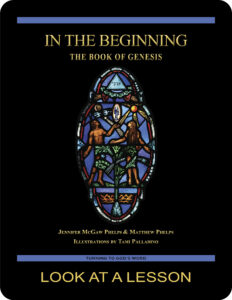 The first seven lessons of In the Beginning: The Book of Genesis, a 28-lesson Catholic Bible study with an imprimatur, provide an in-depth look at the very earliest biblical history—including the two accounts of Creation, events surrounding the Fall of Adam and Eve, the relationship between Cain and Abel, and the baptismal foreshadowing present in the account of Noah and the Flood. Remaining lessons look at lives of the patriarchs Abraham, Isaac, Jacob, and Joseph. Click on the book’s cover to view a sample lesson.
The first seven lessons of In the Beginning: The Book of Genesis, a 28-lesson Catholic Bible study with an imprimatur, provide an in-depth look at the very earliest biblical history—including the two accounts of Creation, events surrounding the Fall of Adam and Eve, the relationship between Cain and Abel, and the baptismal foreshadowing present in the account of Noah and the Flood. Remaining lessons look at lives of the patriarchs Abraham, Isaac, Jacob, and Joseph. Click on the book’s cover to view a sample lesson.
start a Turning to God’s Word Bible study
Thank you for your interest in Thus Says the LORD: God Speaks Through His Servants the Prophets— Volume I: A Kingdom Divided .
.  Information about beginning this or one of our other Turning to God’s Word Bible studies can be found at start a Bible study. Tami, Matthew, and I always are available to answer your Bible-study questions or concerns. Contact us if you’d like to start one of our studies or have your schedule listed with other TtGW study groups on our website. —Jennifer
Information about beginning this or one of our other Turning to God’s Word Bible studies can be found at start a Bible study. Tami, Matthew, and I always are available to answer your Bible-study questions or concerns. Contact us if you’d like to start one of our studies or have your schedule listed with other TtGW study groups on our website. —Jennifer
*There are seven deuterocanonical books in the Old Testament—the Books of Tobit, Judith, Wisdom, Sirach, Baruch, and First and Second Maccabees, as well as some passages in the Books of Esther and Daniel. Protestants usually refer to these works as “apocryphal,” a word that means “outside the (Protestant) canon” because they’re excluded from most Protestant Bibles. The word “deuterocanonical” means “second canon”; Catholics use that word to refer to any section of the Catholic Old Testament for which there are no extant, or existing, Hebrew manuscripts. All of the deuterocanonical books appear in the Septuagint, the earliest remaining versions of which date to the 1st century B.C. This Greek translation of the Old Testament was in common use by Jews at the time of Jesus—but the same books aren’t found in existing Hebrew manuscripts, which aren’t as old as the oldest version of the Septuagint. Learn more by reading How Do Catholic & Protestant Bibles Differ?
Turning to God’s Word printed Bible studies use the 2006 Revised Standard Version Second Catholic Edition (RSV2CE) translation for all Scripture references except those to the Psalms, which are taken from The Abbey Psalms and Canticles, prepared by the Benedictine monks of Conception Abbey and published in 2020 by the United States Conference of Catholic Bishops (USCCB). Scripture on the online study pages for Thus Says the LORD: God Speaks Through His Servants the Prophets—Volume I: A Kingdom Divided links to the 1966 Revised Standard Version Catholic Edition (RSVCE). The New International Version (NIV) audio recordings follow the same chapter and verse numbering as the RSV Catholic translations, but the NIV translation doesn’t include the deuterocanonical books and passages.
The 1966 RSVCE uses archaic pronouns and verb forms such as “thee,” “thou,” “didst” in the Psalms and in direct quotations attributed to God. The 2006 RSV2CE replaces those with more accessible English. A handful of significant translation changes in the RSV2CE include rendering almah as “virgin” in the Book of Isaiah 7:14 and restoring the term “begotten” in the Gospel According to John 3:16.
Numbering varies for some passages in this Bible study. Turning to God’s Word studies (print and digital) follow the numbering in the Revised Standard Version Catholic translations (RSV2CE and RSVCE). Discrepancies in the New American Bible Revised Edition (NABRE) are noted in the Index of Scripture Citations in the study book and the online sample.
 You can learn more about the Psalms by viewing a sample lesson from the Turning to God’s Word Catholic Bible study Sing a New Psalm: Communicating with God Through the Prayers of the Church—Volume I: Lauds & Vespers. The second part of that study, Sing a New Psalm: Communicating with God Through the Prayers of the Church—Volume II: Vigils, Day Prayer & Compline, is scheduled for publication in 2025. Some verse numbers may vary in different translations of the Psalms.
You can learn more about the Psalms by viewing a sample lesson from the Turning to God’s Word Catholic Bible study Sing a New Psalm: Communicating with God Through the Prayers of the Church—Volume I: Lauds & Vespers. The second part of that study, Sing a New Psalm: Communicating with God Through the Prayers of the Church—Volume II: Vigils, Day Prayer & Compline, is scheduled for publication in 2025. Some verse numbers may vary in different translations of the Psalms.
